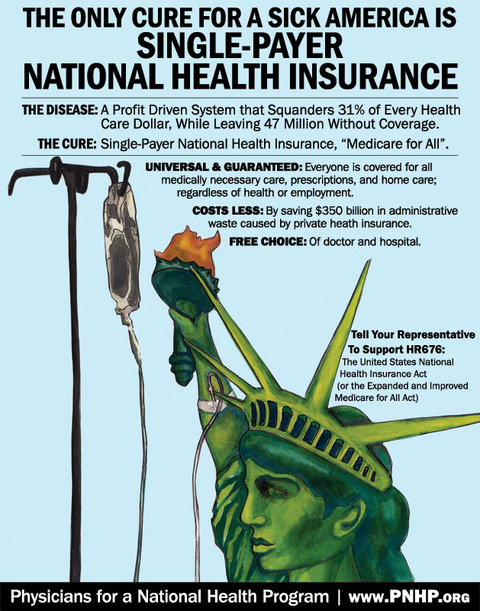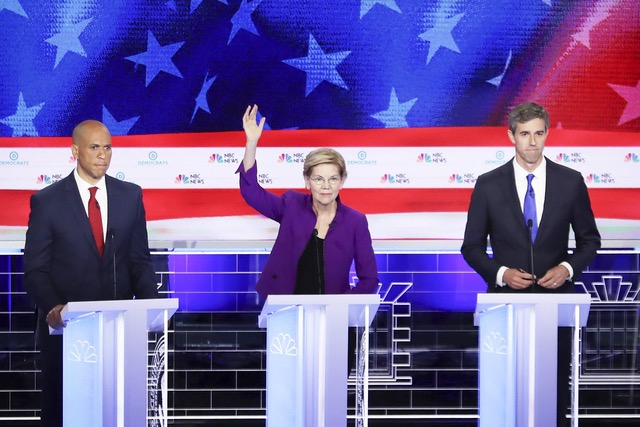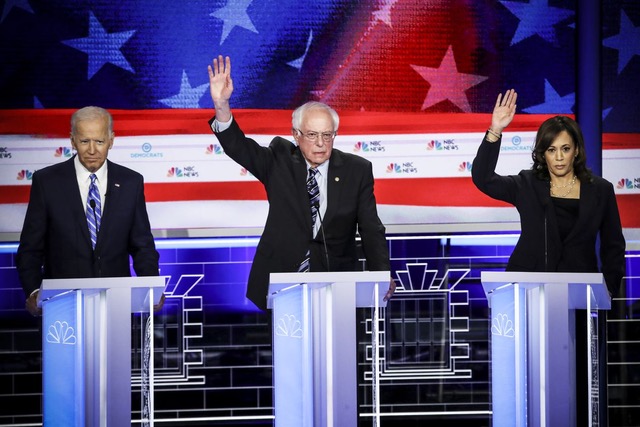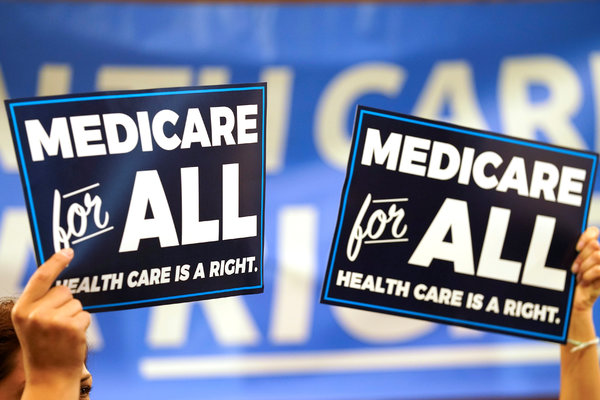
At both nights of the first Democratic extravaganza, the moderator Russell Holt asked for a show of hands — “Who here would abolish private health insurance in favor of a government-run plan?” Before we get to the debaters’ responses, the formulation of the question itself provides much food for thought. “In framing a national health system as ‘government-run,’ the press is helping the insurance industry systematically frame the debate in their own interests.” (Ben Palmieri, National Economic and Social Rights Initiative [NESRI]) By the same token, why would Russell Holt describe national health insurance as “government-run” yet refrain from characterizing the present system of U.S. healthcare as “corporate-run?”
Corporate media’s embrace of the excuses, misstatements and outright lies of the corporate healthcare industry is not a new phenomenon. In the 90s undeterred by the dominant role President Clinton’s healthcare “reform” bill carved out for private insurance companies, the companies themselves with lots of corporate media support went on the attack with their infamous “Harry and Louise” ads warning the public that “the government may force us to pick from a few plans designed by government bureaucrats.” A new century and nothing much has changed. The choice is narrower and instead of a national system, U.S. healthcare is controlled by companies whose allegiance is to their investors and their top executives. Who benefits? According to a report from the National Association of Insurance Commissioners, in 2018 health insurers pocketed $23.4 billion compared to $16.1 billion in 2017.

On the first night, two hands were raised —NYC Mayor Bill de Blasio and Senator Elizabeth Warren. Sen. Warren gave the best answer of the night.
|
“Look at the business model of an insurance company, it’s to bring in as much money as they can in premiums and to pay out as few dollars as possible for your healthcare. That leaves families with rising premiums, rising copays and fighting with their insurance companies to try to get the healthcare that their doctors say they and their children need” |
Among the eight others on night 1, evasions and unworkable alternatives carried the day. Beto O’Rourke’s non-solution was typical. He was supporting a hodgepodge of a bill “Medicare for America,” an unwieldy, bound-to-fail plan combining the worst of two worlds: private insurance and a public option. That unpalatable stew prompted de Blasio to respond — “How can you defend a system that’s not working.”

On night 2, the same question elicited the same insipid responses from eight of the candidates with only Senators Sanders and Harris raising their hands, although Harris later walked back her support claiming she had “misinterpreted the question.” What passes for her real position she announced the next day on Morning Joe — “I am a proponent of ‘Medicare for all,” private insurance will exist for supplemental coverage.” This in spite of the fact that she co-sponsored Sanders’ healthcare plan which allows private coverage solely for elective surgery.
Why the hesitation among the candidates from the party that brought Americans the New Deal and Medicare? As far as fearing backlash from the voters, the opposite may well be true. In June, a poll taken by the Kaiser Family Foundation found that 56% of Americans support a national health plan. Senator Klobuchar, speaking for the majority, claimed that she was unwilling to “kick half of America off their health insurance…”
In 2017, the 58% of Americans covered by employer insurance (Kaiser Family Foundation) have seen their take home pay decrease as employers passed on more of ballooning healthcare costs to them. Since 2008, premiums have increased 55% TWICE as fast as earnings and THREE times as fast as inflation.
In 2018, the Kaiser Family Foundation reported that the average premium for a family of four was $19,616 with workers on the hook for roughly 25% ($5,547). There’s more. Struggling with the exploding cost of premiums, 85% of employees also have a deductible in their plan. “Deductibles of $2,000 or more are increasingly common in employer plans, which means that the bill can pile up quickly for workers who require significant medical care.” (Gary Claxton, Director of the KFF Marketplace Project).
These crippling deductibles on top of the 10% to 12% subtracted from workers’ paychecks to pay for their insurance premiums and the copays which accompany most trips to a specialist are taking their toll on workers’ fealty to private insurance. How do you maintain loyalty to a system that as a result of increased deductibles passed on to workers from their employers led an estimated 23% of working adults (44 million) to be underinsured in 2016, up from 16% (29 million) in 2010 (Commonwealth Fund survey). Other studies have found that Americans forego treatment because of the cost of private healthcare more often than residents in eleven other high-income countries. (Journal of the American Medical Association [JAMA]). Thanks in part to millions of workers struggling under the financial burden of unaffordable health insurance, in 2017 80% of U.S. families say they are living paycheck to paycheck (Career Builder employment website).
How difficult would it be to persuade a majority of workers to throw in the towel on their expensive and increasingly out-of-touch employer health insurance in favor of a national health plan with no premiums, deductibles or copays? Taxes are, of course, an important consideration. But a progressive tax levied on workers and employers, imposition of well-deserved taxes on the wealthy and transaction and other fees on large financial institutions would spread the pain around. In an America where equal treatment is little more than a slogan workers may come to realize they have more to gain in health care security than the loss of illusory job-related insurance.
Standing in the way of a national health plan is a powerful force: the private healthcare lobby. Every year it spends more on lobbying that any other industry group, including, the fossil fuel companies, defense industry and telecoms. Assisting in the shakedown are their corporate media buddies spreading false and misleading information on their various platforms. Their phony news reports and specious commentary from bought-and- paid-for pundits have convinced 69% of Americans that even under a national health plan they would still have to pay deductibles and copays, while 59% believe they would continue to be on the hook for premiums.

The falsehoods, misstatements, and self-serving rationales of health care oligarchs published far and wide on corporate media are the real barrier to the U.S. joining all other high-income countries that treat healthcare as a right. But the winds are shifting. People from all walks of life are waking up to the real state of their healthcare as expensive drugs and procedures are meted out not to those who need them but to those with the ability to pay. At the same time the U.S. is falling farther and farther behind other high-income countries in the general health of its people. The 2020 election is a not-to-be-squandered opportunity to drive the healthcare profiteers out of the healthcare temple and bring in new blood committed to building a system that “guarantees healthcare to all American as a right.” (Bernie Sanders).
982 total views, 1 views today
